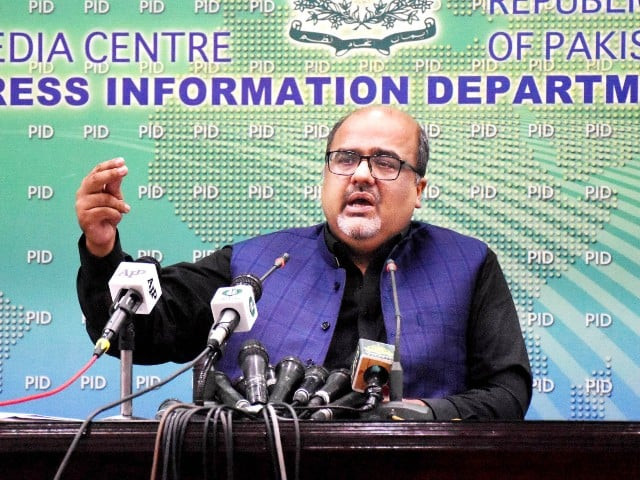Shehzad Akbar named key accused in £190m case
Sources allege that Akbar acted as mastermind behind illegal scheme that caused significant financial losses

Former Asset Recovery Unit (ARU) chief and ex-special assistant to the prime minister on accountability, Shehzad Akbar, has been identified as a central figure in the ongoing £190 million reference case, according to investigative sources. They alleged that Akbar acted as the mastermind behind an illegal scheme that caused significant financial losses to Pakistan.
As part of the investigation, it was revealed that Akbar signed a Deed of Confidentiality on November 6 2019, ahead of the formal approval of the ARU's restructuring and a key cabinet meeting — a move investigators cite as evidence of bad faith.
According to the findings, the £190 million — part of a civil settlement with the UK’s National Crime Agency (NCA) — was diverted to a "designated account" in the name of the Registrar of the Supreme Court. The amount was originally held in the responsibility account of a major private housing society in Karachi.
The agreement was also signed by co-accused Ziaul Mustafa Naseem. Investigators stated the funds were falsely portrayed as being transferred to an official account of the State of Pakistan, while in reality, they were redirected to benefit a private entity.
Records show that Akbar travelled to the United Kingdom twice in 2019 — from February 4 to 8 and again from May 22 to 26 — where he reportedly met with the UK Home Secretary and the Director General of the NCA. During these meetings, he allegedly negotiated a secret road map for the repatriation of funds.
Read More: PTI's Shahzad Akbar departs for Dubai
Officials claim Akbar deliberately excluded key Pakistani institutions such as the Federal Board of Revenue (FBR), the Federal Investigation Agency (FIA), and the State Bank of Pakistan from the decision-making process. This, sources argue, led to substantial financial loss to the Supreme Court and diverted nearly £190 million (approximately Rs50 billion) away from the state.
Sources further revealed that even before cabinet approval, criminal proceeds were transferred from the UK to Pakistan in late November 2019. The move came following a high-level meeting on March 2, 2019 involving Akbar, then prime minister Imran Khan, and principal secretary Azam Khan. The discussion reportedly focused on a settlement with the NCA and the repatriation of funds.
Akbar allegedly overstepped the jurisdiction of the ARU and, in coordination with the then-prime minister, concealed critical facts from the cabinet. Despite presenting the agreement to the cabinet on December 3, 2019, he had already signed the confidential deed on November 6.
According to UK authorities, the NCA had frozen around £120 million before December 14, 2018 under the UK Proceeds of Crime Act 2002. The funds were seized based on suspicion against two Pakistani nationals and related investigations into assets, including the prime London property at 1 Hyde Park Place.
The ARU had reportedly reached a settlement with the housing society on March 13 and 21, 2019, under application No 8758. The respondents offered an out-of-court settlement with the NCA and their legal representatives. The Supreme Court, in March 2019, imposed heavy fines and conditionally suspended criminal proceedings related to the case.
Investigators say Akbar played a pivotal role in misusing authority, acting in bad faith, and concealing corruption-related funds. As a result, legal action continues, with the National Accountability Bureau (NAB) and other authorities conducting inquiries. Akbar has since been declared a proclaimed offender in the case.
What is the £190 million case?
The case alleges that Imran Khan and others involved adjusted Rs50 billion—equivalent to £190 million at the time—that was transferred by the UK's National Crime Agency (NCA) to the Pakistani government.
As PM, Imran Khan obtained cabinet approval for this settlement on December 3, 2019, without disclosing the confidential details of the agreement. The arrangement had stipulated that the funds would be submitted to the Supreme Court.
According to NAB officials, Imran and his wife received land worth billions of rupees intended for the construction of an educational institute.
NAB filed the reference on December 1, 2023 against eight accused persons including Imran and his wife. The court on January 6, 2024 declared the rest of six accused proclaimed offenders as they did not face the trial and escaped to foreign countries.
Read More: Imran Khan, Bushra Bibi indicted in Toshakhana 2.0 case
The court indicted Imran and Bushra on February 27, 2024. The prosecution presented 35 witnesses, whom the defence later cross-examined. Key witnesses in the case included PM's former principal secretary Azam Khan, former defence minister Pervez Khattak and former federal minister Zubaida Jalal.
Three different judges presided over the case at various stages of the trial while the final investigative officer, Mian Umar Nadeem, was cross-examined after 38 hearings. The accountability court provided the accused 15 opportunities to complete their statements under Section 342. However, no witnesses were presented by the defence.





















COMMENTS
Comments are moderated and generally will be posted if they are on-topic and not abusive.
For more information, please see our Comments FAQ